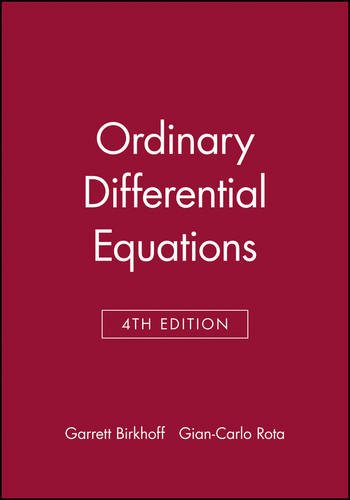Background
Gian-Carlo Rota was born on April 27, 1932 in Vigevano, Italy to Giovanni and Gina (Facoetti) Rota. Gian-Carlo's family left Italy when he was 13 years old, initially going to Switzerland.

He studied at Princeton University.
At Yale, he completed an Master's degree in 1954, and a PhD in 1956.






(A carefully revised edition of the well-respected ODE tex...)
A carefully revised edition of the well-respected ODE text, whose unique treatment provides a smooth transition to critical understanding of proofs of basic theorems. First chapters present a rigorous treatment of background material; middle chapters deal in detail with systems of nonlinear differential equations; final chapters are devoted to the study of second-order linear differential equations. The power of the theory of ODE is illustrated throughout by deriving the properties of important special functions, such as Bessel functions, hypergeometric functions, and the more common orthogonal polynomials, from their defining differential equations and boundary conditions. Contains several hundred exercises. Prerequisite is a first course in ODE.
http://www.amazon.com/gp/product/0471860034/?tag=2022091-20
Gian-Carlo Rota was born on April 27, 1932 in Vigevano, Italy to Giovanni and Gina (Facoetti) Rota. Gian-Carlo's family left Italy when he was 13 years old, initially going to Switzerland.
The young Rota completed his secondary education at the American School of Quito, Ecuador, in 1950 and went on to Princeton. At Yale, he completed an Master's degree in 1954, and a PhD in 1956.
Much of Rota's career was spent as a professor at the Massachusetts Institute of Technology (MIT), where he was and remains the only person ever to be appointed Professor of Applied Mathematics and Philosophy. Rota was also the Norbert Wiener Professor of Applied Mathematics.
He taught a difficult but very popular course in probability. He also taught Applications of Calculus, differential equations, and Combinatorial Theory. His philosophy course in phenomenology was offered on Friday nights to keep the enrollment manageable.
Rota began his career as a functional analyst, but switched to become a distinguished combinatorialist. His series of ten papers on the "Foundations of Combinatorics" in the 1960s is credited with making it a respectable branch of modern mathematics.
Rota died of atherosclerotic cardiac disease, apparently in his sleep at his home in Cambridge, Massachusetts. He died just a few days short of his 67th birthday. His death was discovered after he failed to arrive in Philadelphia for lectures he had planned to present beginning on Monday April 19, 1999.
(A carefully revised edition of the well-respected ODE tex...)
Gian-Carlo was a member of numerous other mathematical and philosophical organizations.
Among his many eccentricities, Gian-Carlo would not teach without a can of Coca-Cola, and handed out prizes ranging from Hershey bars to pocket knives to students who asked questions in class or did well on tests.
Gian-Carlo's marriage to Teresa Rondon in 1956 was dissolved in 1980.
